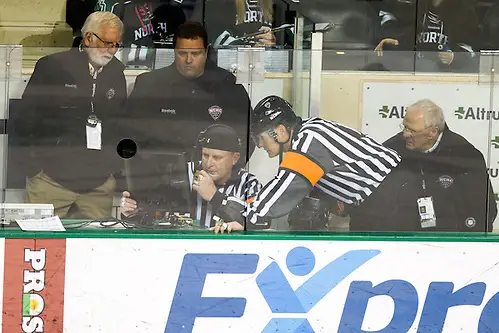
For the third straight season, the NCAA tournament ended with a first-time champion in 2015. Fourth-seeded Providence finished a late-season run with two third-period goals to beat Boston University in the national championship on April 11.
That game featured 13 NHL draft picks, not to mention the likely No. 2 selection in this year’s draft.
“There’s an ever-increasing quality of talent in NCAA hockey,” said Mike Snee, executive director of College Hockey Inc. “More players than ever in the NHL have a college hockey background and it’s going to become more and more each year.”
The NCAA tournament not only showcased this increased talent but also some potential talking points for the annual American Hockey Coaches Association convention in Naples, Fla. The convention starts on Wednesday and runs through Sunday.
Several of those points — universal officials and expanded use of video replay for major penalties — stemmed from one play in Providence’s win over Denver in the East Regional final.
Pioneers defenseman Joey LaLeggia was called for a five-minute major and disqualification for contact to the head at 10:37 in the third period. The Friars scored the go-ahead goal on the ensuing power play.
In the postgame news conference, Denver coach Jim Montgomery eloquently expressed his desire for a national officiating crew to help establish universal standards for calls.
However, Hockey East commissioner and AHCA executive director Joe Bertagna said he is in favor of keeping the current officiating setup, saying a national pool of officials wouldn’t be practical.
Bertagna said it wasn’t just a matter of assigning officials to work games nationwide; someone has to mentor and teach them as well.
“Each supervisor has his own idea. Even within the same book there’s some room for interpretation,” Bertagna said. “Within the league some guys call it higher than others — that’s just human nature.”
He also mentioned the cost associated with flying officials around the country, pointing to the logistics involved when Hockey East added Notre Dame two seasons ago.
“With Notre Dame, it was difficult with one school but to try to coordinate assigning to 60 schools, I don’t think it makes sense,” Bertagna said.
As for replay, NCAA tournament officials may use video replay during a game to review penalties that would result in the removal of a player to ensure proper enforcement. This usage could be expanded, according to Bertagna.
Regional sites on campus and potential PairWise Rankings tweaks will also be discussed, according to Clarkson coach Casey Jones, who is heading the Division I coaches’ open meeting on Wednesday.
“The over simplification is that schools that are strong programs like that if you finish as the top draw you can bring it back to campus and almost guarantee a sellout,” Bertagna said. “For smaller programs, it’s harder to upset, and upsets make for exciting tournaments.”
The PairWise Rankings formula has undergone occasional tweaks in recent years.
“There was a big cliff where teams were moving; that’s concerning, I think,” Jones said, referring to the fluctuation in the rankings. The coaches can discuss adjustments to the PairWise and then present it to the NCAA.
Goalie contact to be examined
The NCAA rule book gets updated every other year, and this is an off year so no new rules can be proposed. However, the interpretation of the rules can be tweaked, according to Bertagna.
One of those tweaks could involve looking at the measures put in place to protect goalies.
“Are the safeguards in place now taking away good goals on a violation that wasn’t affecting the play?” said Bertagna, a former Harvard goalie. “I’m part of a group that feels we’ve gone too far for these protections. How do we address this and not go the other way and encourage guys to bump goalies?”
Westward expansion
One item on this year’s agenda is a presentation on fundraising and alumni relations by Arizona State coach Greg Powers and the Buffalo Sabres’ Joe Battista, who helped facilitate the fundraising to move Penn State to the Division I level.
Arizona State announced it was starting a Division I program last November, a process that gained momentum at last year’s meeting, according to Snee.
The first real meeting about that move took place in Naples last year, with Snee, Powers, Battista and College Hockey Inc. deputy executive director Nate Ewell discussing the Sun Devils’ move to Division I.
That move came quicker than expected, as Snee said they would have taken Arizona State announcing it would move to Division I in eight years.
Despite the accelerated time table, don’t expect any new programs to come out of this year’s meetings. The potential for expansion is there, however, pointing to the expanded television coverage of college hockey, including a deal with TSN in Canada.
Before Arizona State’s move, college hockey on the West Coast seemed to many like a dream that would never happen, Snee said.
“Now most people think it’s a dream that not only could happen, but will happen,” he said.


